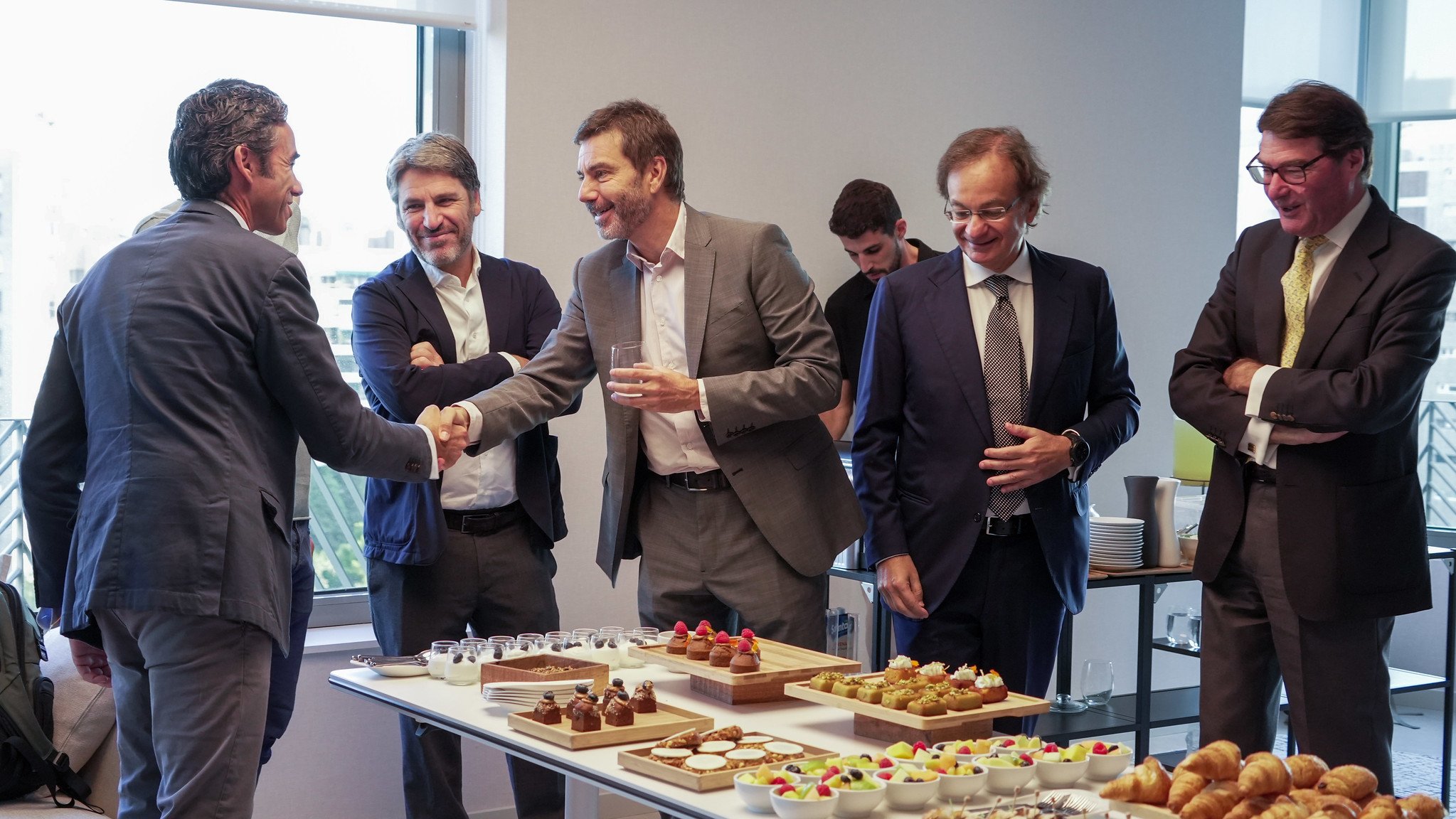CITY’S ROLE IN FOREIGN INVESTMENT ATTRACTION
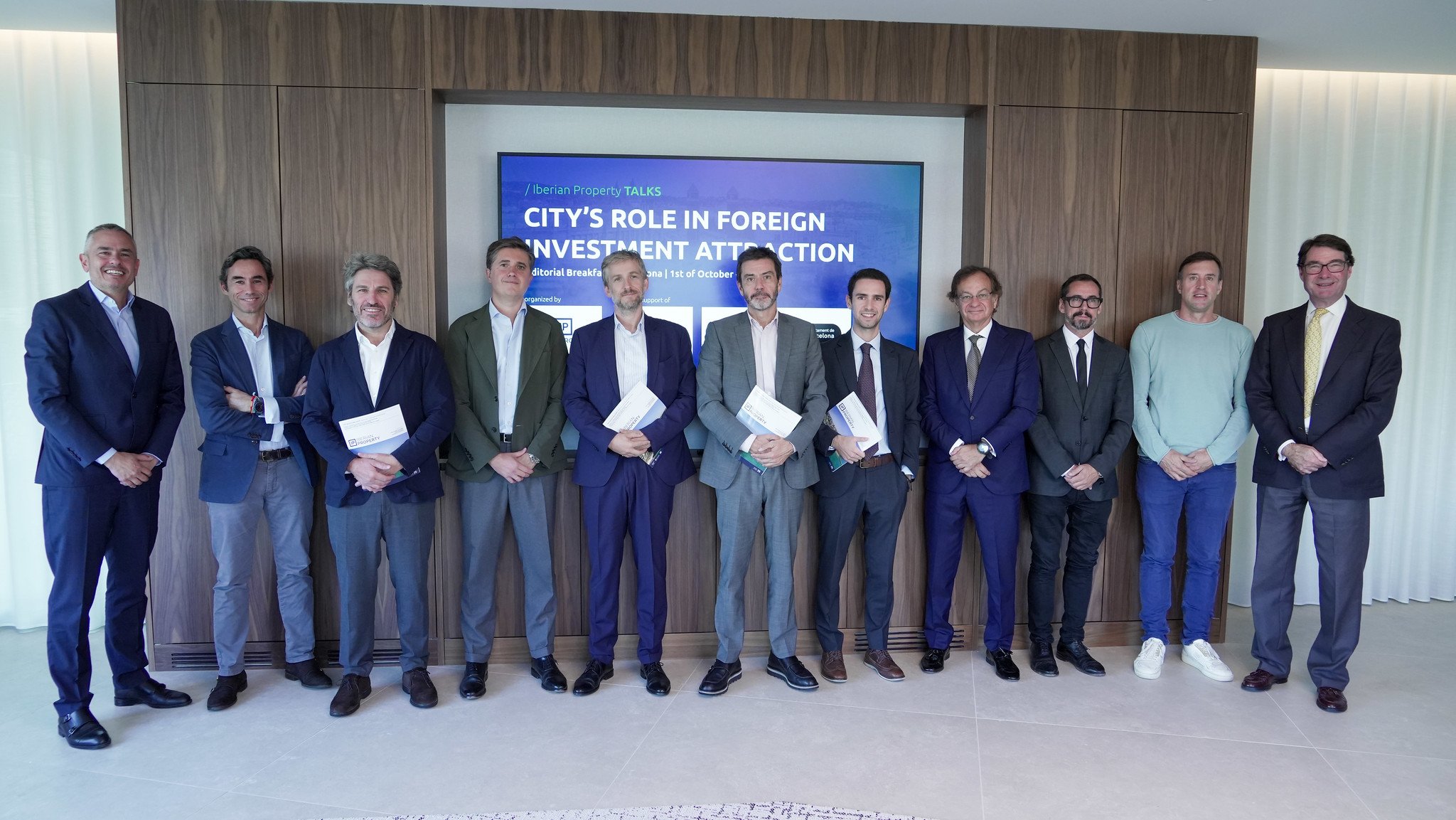
BARCELONA — A city regaining institutional confidence
To debate this topic, Iberian Property hosted an Editorial Breakfast, with the support of Cushman & Wakefield, Barcelona Investment Office and Barcelona City Council, which took place on the 1st of October at the new C&W headquarters on Avenida Diagonal.
Under the theme “City’s role in foreign investment attraction,” investors shared their thoughts on how Barcelona’s unique characteristics shape investment strategies and market dynamics. The conversation delved into the weight of city branding, the impact of municipal regulation, and the broader perception of Barcelona’s competitiveness on the global stage.
Perception and the power of city branding
Opening the discussion, Miquel Rodríguez Planas, Director of Economic Development at Barcelona City Council, set a confident tone: “We are all aware we live in complex times, but Barcelona — within Catalonia, Spain and Europe — finds itself in a very interesting position.” In his view, the instability that once cast doubt on the city has been reframed by global realities. “Investors everywhere have learned to live with uncertainty. What matters now is how cities generate confidence, and in that regard, Barcelona today offers a sense of security and stability that some other regions, traditionally seen as safer, are losing.”
Miquel underlined the municipality’s more active stance: “We’ve made a clear commitment to fostering business and attracting foreign capital. The city’s new agenda reflects that shift.”
Pere Viñolas, CEO of Colonial, added that the so-called “political risk premium” has largely faded. “From an investment perspective, we are clearly in a better situation than three or four years ago,” Pere said. “The perception of Barcelona as a reliable and resilient destination has improved significantly.” But he also reminded that perceptions don’t change overnight: “You still need to row twice as hard to attract one euro to Barcelona compared with Madrid. The reality is improving, but brand recovery takes time — and city branding is built over years and can be lost in a day.”
Oriol Barrachina, CEO of Cushman & Wakefield Spain, pointed to a lingering gap between substance and narrative. “What we usually don’t excel at,” Oriol reflected, “is managing the external story. Internally, we are self-critical, and rightly so — but outwardly, we need to project more common sense and pride. Barcelona is competing with the leading capitals of Europe like Paris, Berlin, Milan, and others. To be the best in Spain is no longer enough.”
For Ignacio Sagües, Country Head for Spain at Starwood Capital Group, this narrative is essential. “We must all become prescribers of Barcelona — not just internationally, but locally too. The way we speak about our city matters. When global investors come here, they ask us for references. If we don’t describe Barcelona positively ourselves, it’s difficult to convince others.” Ignacio added that for investors with longer horizons, the fundamentals are compelling: “If you want to be well positioned when perceptions improve — and they will — you need to enter at the right moment. For long-term capital, Barcelona offers solid fundamentals.”
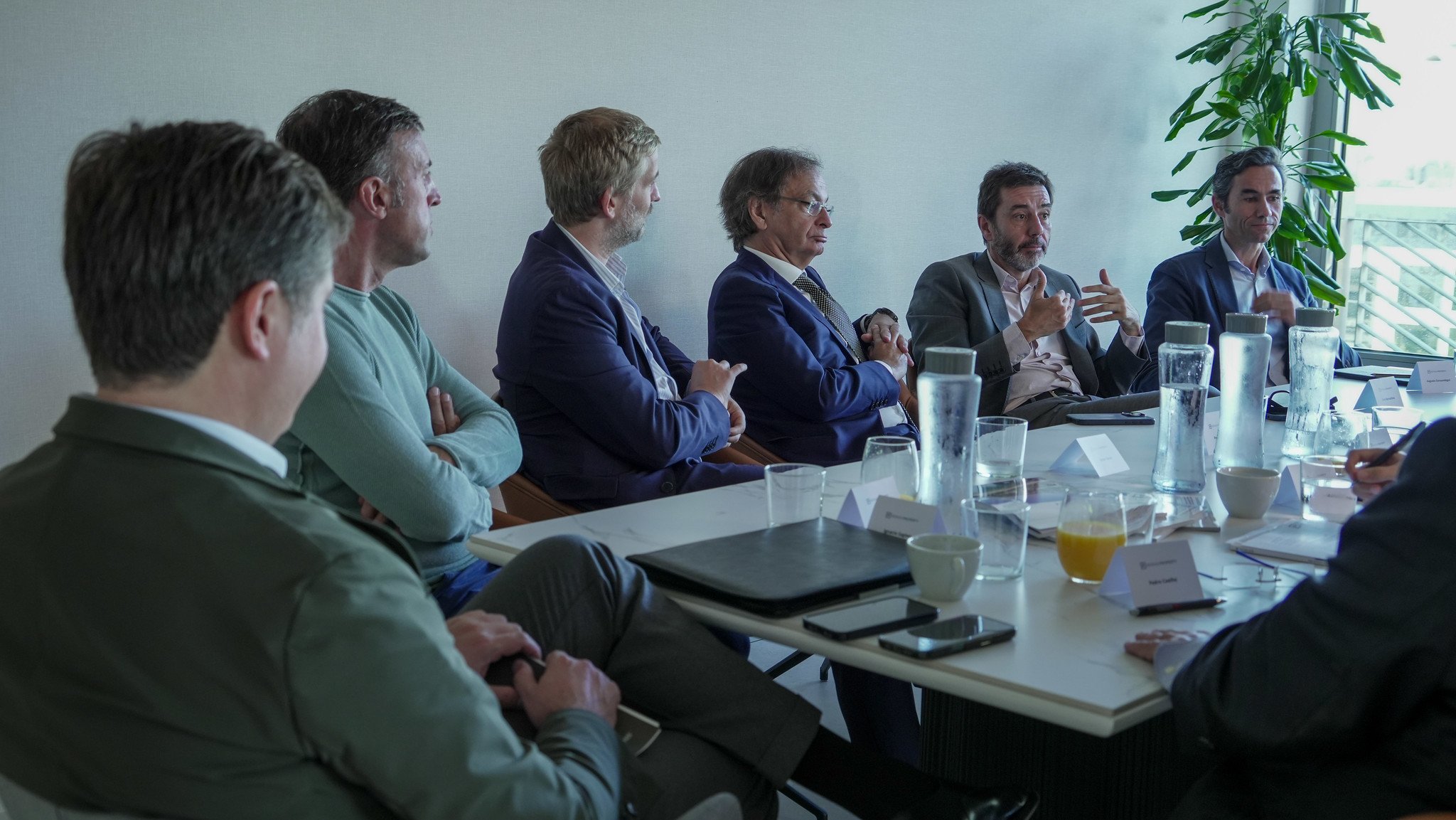
Public-Private coordination and the question of agility
Beyond perception, investors highlighted practical challenges in the regulatory environment. Oriol Barrachina was direct: “It remains far too difficult to convert obsolete offices into housing or other uses. This limits the city’s ability to respond to social challenges like housing or sustainability. In New York, hundreds of thousands of square metres have been transformed from offices to residential. In Barcelona, similar projects face structural barriers.”
He acknowledged recent progress through better coordination: “In the last few years, we’ve seen a big improvement between the public and private sectors — and between different city departments. When City Hall, the district office, urban planning and health authorities sit together at the same table, things move forward.” Oriol summed up the private sector’s expectations in two words: “velocity and flexibility.”
Miquel Rodríguez Planas agreed that closer cooperation is crucial, highlighting the city’s new strategy to actively target investment in high-value sectors. “We are no longer waiting for investors to come to us,” he said. “We are going out to them. Barcelona must be on the radar for those who seek talent and innovation — and that requires active diplomacy.”
Talent, Diversification and Opportunity
Miquel also stressed the importance of a balanced economic base. “Tourism and commerce give Barcelona its unique identity, but they also create externalities that need managing. Our goal is to ensure a sustainable, high-quality tourism model while protecting local life.” He pointed to new engines of growth — health, biotech and advanced digital industries. “Next year marks the 20th anniversary of the Mobile World Congress,” he noted. “But we’re moving far beyond that. Barcelona is becoming a global scientific capital, among the top 20 worldwide and top 6 in Europe. Talent is our true natural resource.”
From an investor perspective, Pedro Coelho, CEO of SQUARE Asset Management, highlighted the value of patience: “Real estate is not like equities — you invest for the long term. If the fundamentals are right, the city works, and right now, Barcelona offers quality assets at reasonable prices.”
Ignacio Sagües echoed this counter-cyclical view. “Sometimes it pays to go against the trend,” he said. “Those who invest now, when perception is still recovering, will be well positioned when the next cycle turns.”
Looking at market trends, Oriol Barrachina stressed that the city has a post-pandemic advantage: “Here, offices are full. People want to come to work. That’s not the case in many global cities. Our combination of quality of life, modern space and urban vitality gives us a clear edge.” He concluded with a reminder of Barcelona’s global potential: “We shouldn’t compete on price — we should compete on quality. With our architecture, urban design and connectivity, we can and should play in the same league as Milan or Paris.”
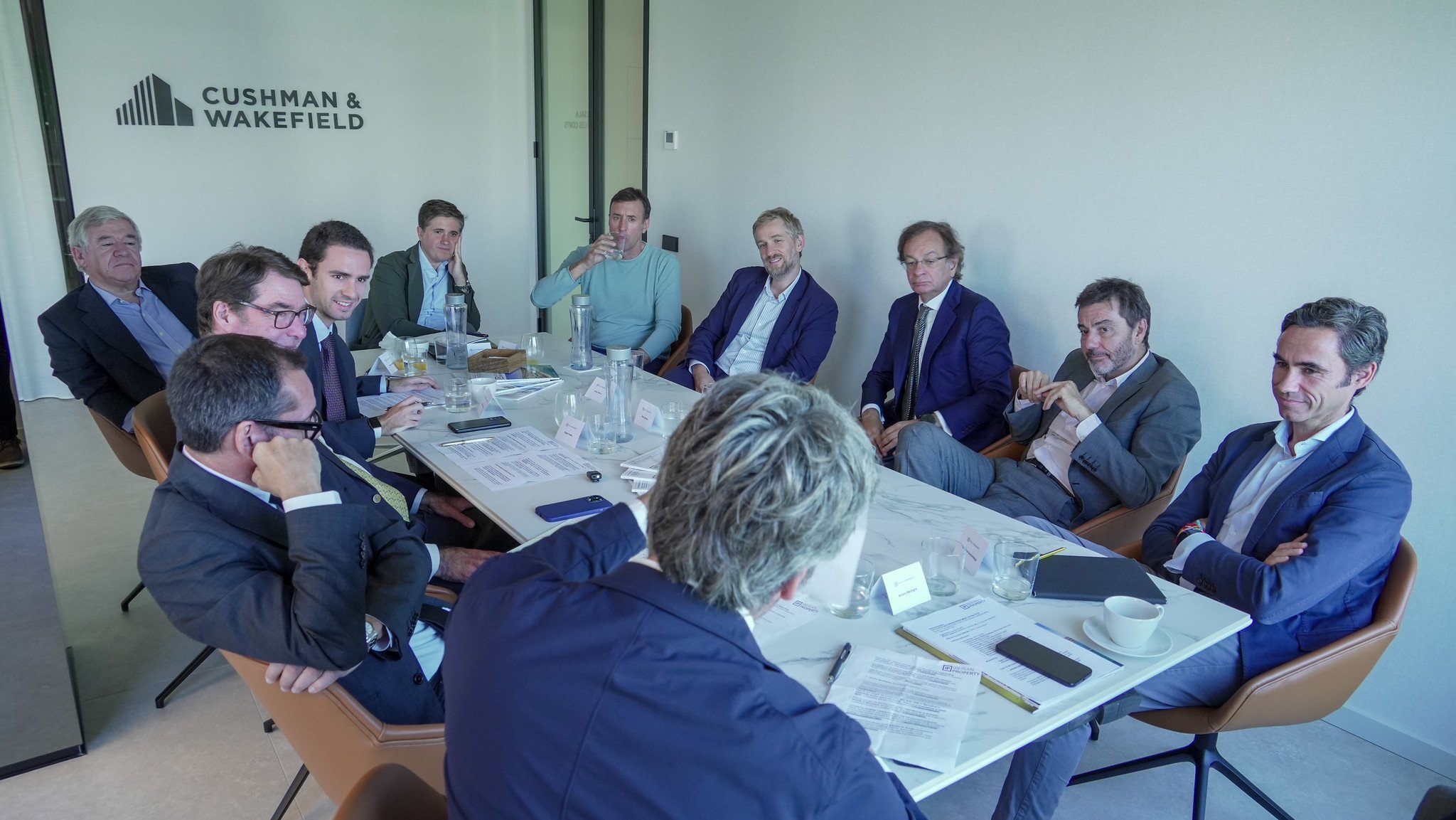
Investment focus: from Obsolescence to Opportunity
The conversation turned towards the future of investment in Barcelona — where opportunities lie, how investors are adapting, and what must change for the city to fully realise its potential.
Augusto Zunzunegui, Senior Director of Acquisitions at HINES, began by reflecting on office assets and the question of obsolescence. “For investors like us,” he said, “the opportunity to transform is what creates value. There’s a lot of obsolete stock in the city, and that’s exactly where we see potential. But flexibility and speed are essential.” He explained that while refurbishing offices for continued office use is relatively straightforward, converting them to other functions remains a challenge. “In Madrid, obsolete offices are being reconverted into new uses, which is dynamising the market. In Barcelona, that process moves slower, and that’s a missed opportunity.”
Still, he pointed to the positive: rising demand and rents in well-located buildings. “We’re seeing office rents above €40/sqm/month — and that’s because the city has genuine demand. Spain is leading the return-to-office trend, and Barcelona is no exception.” For Augusto Zunzunegui, the fundamentals remain strong: “From London or Frankfurt, investors don’t really worry about local politics; they care about legal security and return. Barcelona offers both, and that’s why the city continues to be a clear investment opportunity.”
Howard Pierce, Partner at Urban Input, added a note of caution — legal certainty exists across most sectors, except housing. “We have more than 4,000 residential units in Spain, 400 in Barcelona, and the only place where we can’t rely on a stable legal framework is in housing,” he explained. “Indices are unclear, and policies change with every election cycle. It’s not about criticism — it’s about clarity. Investors can work with regulation, but we can’t work with uncertainty.”
Victor Iborra, Partner Real Estate at Meridia Capital, agreed. “That’s why housing has fallen off the radar for institutional investors,” he said. “It’s frustrating, because we believe deeply in Barcelona, but the current framework makes institutional-scale housing projects almost impossible.” He noted that concepts like flex living — now common in several European regions — are virtually non-existent in Barcelona due to constant shifts in regulation. “It’s not that investors are unwilling; it’s that the rules change too often. Stability and consistency are what’s missing.”
"At times, when planning processes slow down, so does private investment — and that affects the city’s ability to transform”.
With a large track record of operations in the city, Paco Hugas, Partner at Conren Tranway, shared that the company has invested over €1.5 billion in Barcelona over the past decade, “so we’ve had the chance to understand its cycles and challenges. At times, when planning processes slow down, so does private investment — and that affects the city’s ability to transform”, he noted. Still, he expressed strong long-term confidence, while encouraging the city to continue strengthening its narrative: “There are other cities, Malaga for instance, that promote themselves very effectively — even if their product isn’t as strong. Barcelona already has the fundamentals and an institutional background of renowned investors deploying capital; we just need to channel that energy to attract more investment.”
Pedro Coelho, raised a comparative perspective from Portugal. “Population growth alone creates enormous housing pressure,” he said. “In Portugal, we ask from municipalities the same things — to make it easier to change use, to repurpose buildings, to create more flexible frameworks. That’s what helps investment flow where it’s needed.”
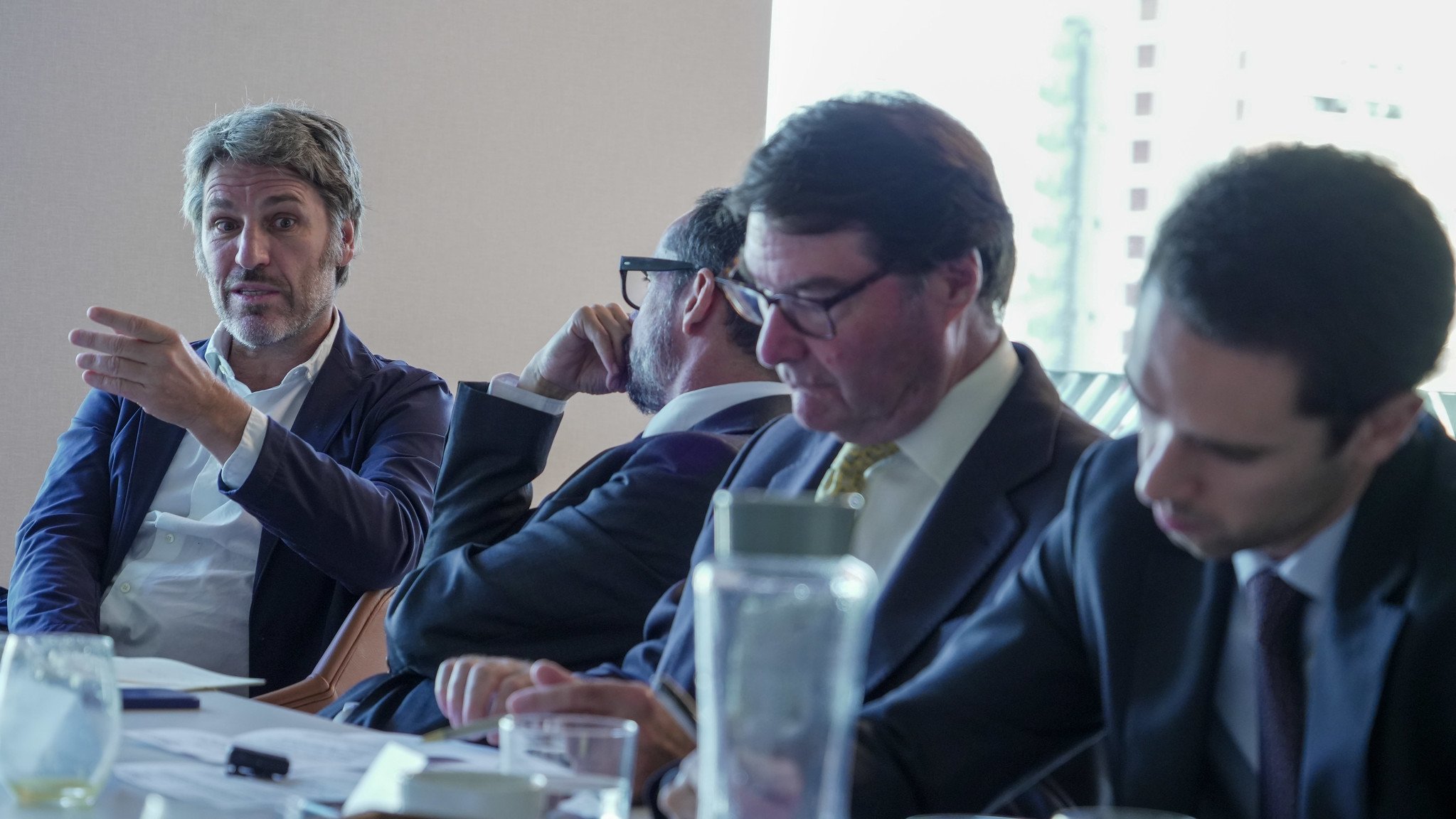
Science, Innovation and the next wave of Growth
Pere Viñolas steered the discussion towards a more optimistic horizon: “Let’s look at what we can do right,” he said. “Globally, real estate is in a lower cycle, but if we identify growth sectors, capital will follow.” For him, science and innovation represent one of the clearest opportunities for Barcelona to stand out internationally.
“There’s a global shift,” Pere Viñolas explained. “Money is moving to private credit and infrastructure, so for real estate to attract capital, it must show a growth story. Science, health and innovation allow you to do that — they let you connect the asset to the people inside it, to talent and long-term value creation.”
He pointed to Barcelona’s exceptional positioning in this field. “The city already has powerful anchors: the Supercomputing Centre, the Biomedical Research Park, and a network of health and biotech facilities that were largely driven by public investment. These have built global visibility and credibility. In biotech and pharmaceuticals, Catalonia accounts for nearly half of Spain’s industry, and in clinical trials we’re among the top European cities.”
This, the CEO of Colonial argued, gives Barcelona a narrative that resonates internationally. “We’re living in the era of narratives — and this is a good one. Science and innovation are growth engines that connect talent, investment and place. If we build around that, Barcelona can lead not just locally, but within Europe.”
Miquel Rodríguez Planas concurred with this vision, highlighting how the city administration is adapting planning rules to encourage such growth. “We’ve updated our urban regulations to incorporate the concept of laboratories,” he said. “Modern labs are no longer rooms full of test tubes — they are spaces for data science, artificial intelligence, and biotech innovation. We want to make sure our zoning and permitting allow for these new realities.”
He also pointed to new development zones with strong potential — from Diagonal Sud and the Clinical area to La Sagrera. “We’re working to accelerate projects where investment, innovation and urban growth intersect,” he said. “We know we need to be faster and more flexible, and we’re working towards that.”
Housing, Talent and the City’s Competitive Edge
The conversation closed on a central theme: housing and talent. For Miquel, the issue extends far beyond local politics. “Housing is a global challenge,” he said. “But we recognise that flexibility and speed are areas where we must improve.”
He explained the structural complexity of decision-making in the city: “We govern with 10 councillors out of 41 — and that limits capacity, even when the will is there. But the city is doing well. Investors see that, and we are attracting record levels of investment.”
Barcelona, he noted, is now working with European partners to secure funding for urban housing initiatives. “For the first time, the European Council president has met with the mayors of Barcelona, Paris and Rome to discuss a European housing budget. That shows this is not a local issue — it’s continental.”
Paco Hugas emphasised that the housing question is directly tied to the attraction of talent and higher education. “There are between ten and fifteen universities currently seeking to establish a base in Barcelona,” he said. “That’s extraordinary. But for that to translate into long-term impact, we need housing — for students, researchers, and professionals. Otherwise, we risk losing the advantage.”
He closed on a note that combined realism with optimism: “Spain has something unique — a lifestyle, a climate, a rhythm of life that others can’t replicate. The Mediterranean way of living, working and connecting is becoming a competitive advantage. Barcelona and Madrid will both benefit from that. But for it to last, the city needs to ensure that housing and infrastructure can keep pace with the people who want to come.”
The roundtable ended with a shared sense of purpose: Barcelona’s potential remains undeniable. The city’s future — in innovation, investment and quality of life — will depend on how it balances regulation with flexibility, and vision with execution.
